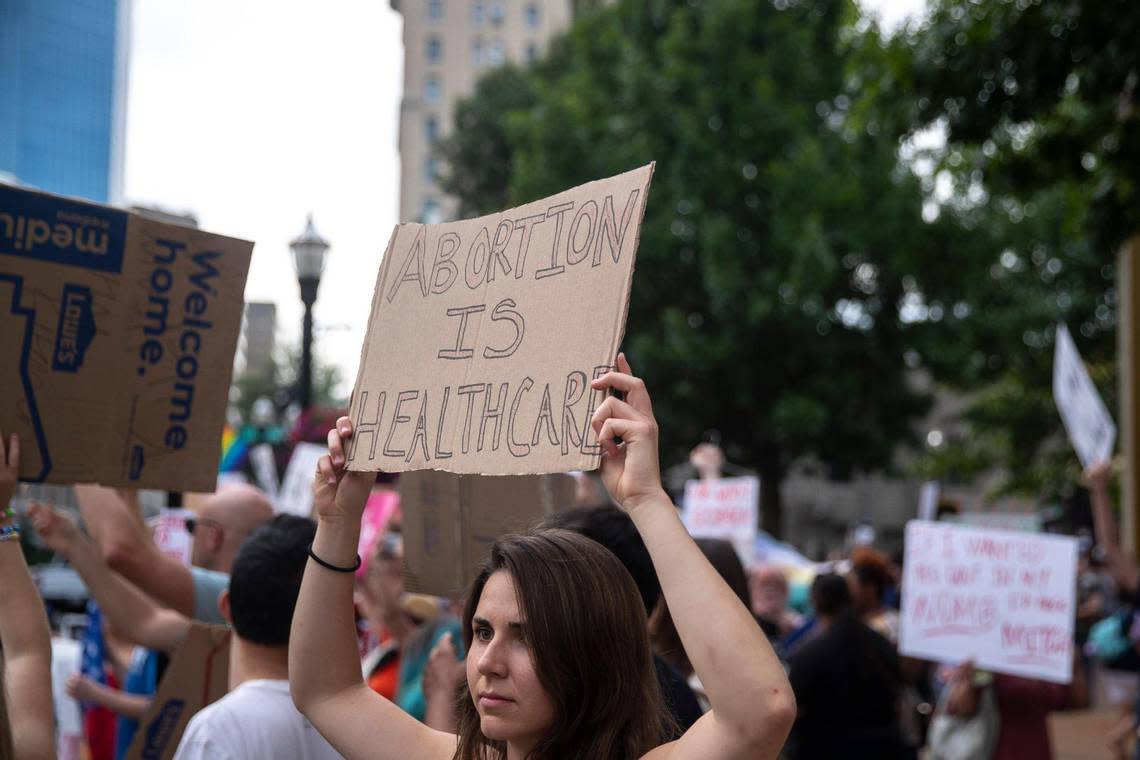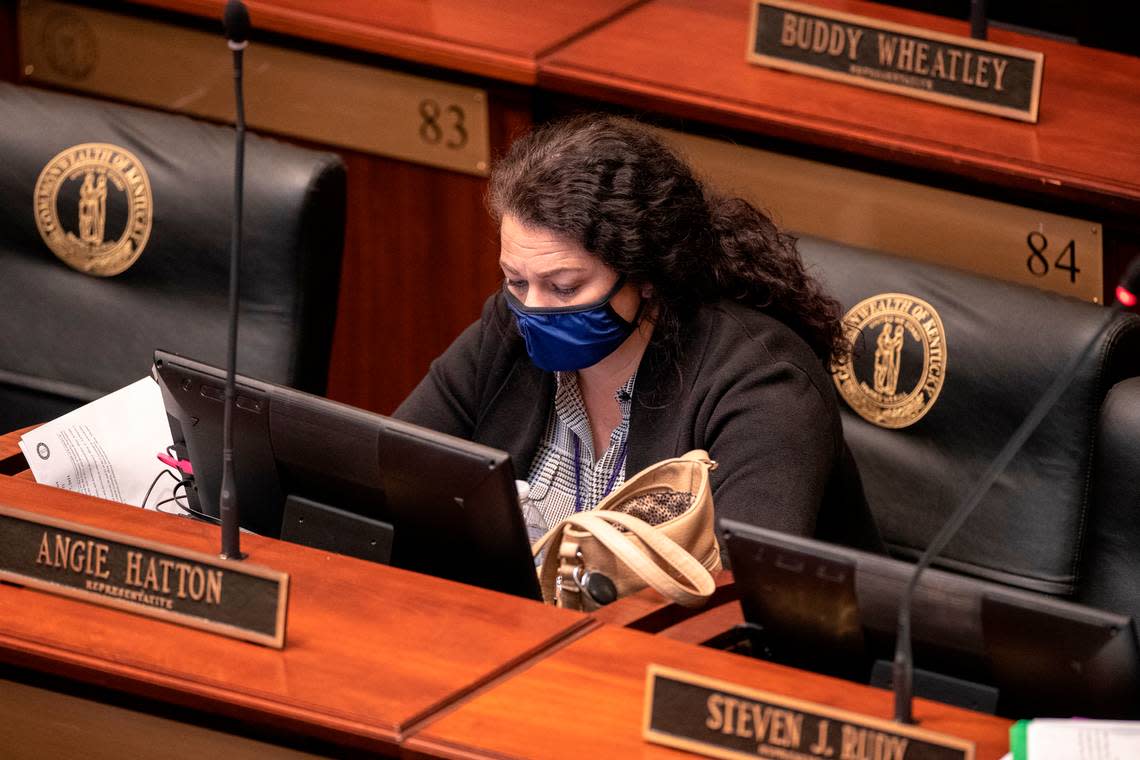Is Kentucky as polarized over abortion as its politicians? Democrats are hoping not
In a seventh-floor courtroom in Louisville earlier this month, Kentucky Deputy Attorney General Victor Maddox asked a question of a local OB-GYN.
“Would you agree with me that abortion is a procedure that ends pregnancy?” Maddox asked.
Dr. Ashlee Bergin said from the witness stand that yes, abortion ends a pregnancy. Bergin, a board-certified OB-GYN at the University of Louisville and provider of abortions at EMW Women’s Surgical Center, was testifying in favor of a lawsuit challenging a six-week ban on abortions as well as a trigger law, which makes nearly all abortions illegal.
Maddox works for Republican Attorney General Daniel Cameron, who has repeatedly asked the judicial system, to no avail, to let him enforce the state’s ban. The trigger law outlawing abortion includes exceptions for medical emergencies, but none for rape or incest.
Maddox asked if a fetus had a detectable heartbeat after, say, eight or 10 weeks. Bergin again said yes.
“So, if that abortion is done after the eighth week or so,” Maddox said, “would you agree in every case that abortion actually stops a beating heart?”
Bergin paused, considering her response.
“That’s not how I view it,” she said.
Maddox pressed: “You don’t consider (a) human fetus an unborn child?”
Bergin said her role as an OB-GYN was to rely on best medical practices as defined by the American College of Obstetrics and Gynecology, and tailor her care to meet the needs of her patients, often pregnant women. That care could include abortion, but it’s not for her to decide what’s best for any single individual, she said.
“Providing patient-sensitive care is listening to what the patient is wanting and making sure she’s fully informed of all her options,” she said, dodging Maddox’s probe for a yes or no answer.
Injunction hearing in Louisville over Ky’s trigger law banning abortion is starting. Last night the Ky Supreme Court *denied* AG Cameron’s request to bypass this court’s order & let him enforce the trigger law. pic.twitter.com/klfpRQD3MP
— Alex Acquisto (@AcquistoA) July 6, 2022
These binary perspectives on what abortion is and isn’t typify the tension between Kentucky Republicans and Democrats in the General Assembly. It’s a division that has come to dominate dialogue and one that leaves little room for common ground: either life begins at conception and therefore abortion ends the life of an unborn human being, or abortion is a medically safe part of comprehensive reproductive health care. Without it, one loses their bodily autonomy and is forced to give birth.
When Republicans took back control of the General Assembly in 2016 for the first time in almost a century, this diametric feud only intensified. By sheer force, Republicans have passed more than a dozen laws (and attempted to pass many more) that have corroded abortion access in the commonwealth. Democrats have tried to stop passage of these bills with impassioned speeches and no votes, but their power is neutered by Republican dominance, which has since grown to a super majority.
“It’s like they were playing chess,” Democrat Rep. Josie Raymond said of the Pro-Life Caucus that churned out these bills. “‘If this happens, this goes into effect. If these laws overlap, fine by us; we’re just going to try everything we can.’”
That tactic worked, and it takes more than two hands to count how many times Democrats have ceded ground on this issue. That loss culminated in late June, when the U.S. Supreme Court struck down 50 years of federal protections for abortion, immediately paving the way for Kentucky’s trigger ban — another GOP-backed law from 2019 — to take effect.
Now that the party with historic power in Kentucky is politically neutered, they’re grappling with how to meaningfully fight back without ceding even more ground. Though Republicans have been chipping away at abortion access for six years, Democrats have only just begun to build a coordinated response.
‘Republicans overplayed their hand’
If there is a compromise to be had around when abortion should be legal, neither party is budging.
Despite their losses, a change in Democrats’ messaging around abortion doesn’t seem to be on the table, according to sources interviewed by the Herald-Leader. In many ways, Democrats are doubling down, telling Kentuckians to vote, but now with an eye toward defeating a constitutional amendment question on the ballot this November.
Many are buoyed by a late June public opinion poll conducted by the Garin-Hart-Yang Research Group, touted by the Democratic Governors Association, that shows 62% of Kentuckians oppose the state’s abortion ban that leaves no exceptions for rape or incest. Fourteen percent of those polled said abortion should be illegal in all cases.
Beyond those exceptions, there’s no wiggle room in either party’s platform. At this point, “It’s hard to compromise between, there shouldn’t be abortion and there should be,” said Louisville Democrat Rep. Lisa Willner. “What is the compromise there?”
Sen. Whitney Westerfield, R-Crofton, said he thinks the state has already spoken — it’s hard to argue that voters don’t want a Republican’s approach to abortion policy when they keep electing them.
“From a political side, I think Democrats just need to realize that their national platform on abortion is not what most Kentuckians prefer,” he said. “As long as they continue to stand by national leaders, they’re going to continue to lose.”

As the minority party, Democrats can’t force Republicans to find middle ground, said Rep. Rachel Roberts, a Democrat in Northern Kentucky who shares a county with Fort Thomas Rep. Joe Fischer.
Fischer, prominently anti-abortion and running for a seat on the Kentucky Supreme Court, was lead sponsor on a bill to change Kentucky’s constitution to reflect that will. Since such a change ultimately requires voter input, residents this November will vote “yes” or “no” on whether to add, “nothing in the state constitution shall be construed to secure or protect a right to abortion or require the funding of an abortion.”
If passed, the amendment wouldn’t ban abortion, but it would make clear that there are no fundamental constitutional protections for it in Kentucky — the basis of Planned Parenthood and EMW’s legal challenge to the trigger law and six-week ban playing out now in Jefferson Circuit Court.
Democrats and pro-choice advocates are banking on the failure of this referendum to be a bellwether for abortion policy moving forward in Kentucky. They’re hoping for defeat to show that Frankfort Republicans’ lockstep efforts to eliminate abortion access almost entirely in the state has careened, fueled by a political agenda and not actual voter will.
To do this, Democrats are pointing to Republicans’ immovability on when abortion should be reasonably legal.
A “compromise” isn’t banning abortion with no exceptions for rape or incest, Roberts said, whose Campbell County constituency is heavily Catholic. And Republicans have refused to budge on those exceptions, so far, though there are indications that may change.
“The overwhelming tone and tenor seems to be: people want abortion to be exceedingly rare, but that it should be available in those cases where it is needed,” said Roberts, who has previously shared she was raped as a teenager.
In conducting her own polling and knocking on doors for her campaign (she’s up for re-election in November), she’s finding her constituents generally agree.
“When I talk to them about my own personal experience, and that I don’t believe abortion should be banned in every circumstance, I haven’t had a single person to tell me, ‘get off my porch, I totally disagree with you,’” she said. “Generally, we start having that conversation about nuance.”
Capitalizing on this nuance in a deep canvassing campaign to defeat the GOP-backed constitutional amendment is, right now, one of Democrats’ only actionable paths forward, many Democrats interviewed for this story agreed.
“I think that, truly, from a political standpoint, the pro-life movement has overplayed their hand here,” Roberts said. “We have now gone into territory that is against the will of the majority of Kentucky.”

‘Here, we are very divided’
Eastern Kentucky Rep. Angie Hatton remembers when pro-life Democrats were aplenty in Frankfort.
In 2016, when former president Donald Trump was elected, 18 seats in the Kentucky General Assembly House flipped for Republicans. Hatton, a pro-life Democrat, was one of just five Democrats who won their elections. She represents portions of Pike, Letcher and Harlan counties.
“I’m an anomaly now, but I wasn’t just a few years ago,” said Hatton, who remembers at least 12 Democrats who, when she was elected, were pro-life. Hatton, who’s now House minority whip, along with Rep. Ashley Tackett Laferty, Sen. Dennis Parrett and Sen. Robin Webb, are the only remaining pro-life Democrats in Frankfort. They all represent Eastern Kentucky voters, except for Parrett in Elizabethtown.
Both parties are at fault for intensifying the political divide on abortion, which has in turn caused centrist representation on the issue to dwindle, she said.
In looking at the current makeup of the General Assembly and where members fall on abortion, a clear divide between urban and rural, red and blue emerges, leaving “unicorns” like Hatton alone in the middle, she said.
“I worry that Kentucky’s Democrats haven’t made room for the considerable number of pro-life Democrats in rural America,” she said. “Louisville is a quarter of our population, and I get that. But they don’t think like the rest of us on this issue.”

On the day Roe was overturned, Democrats representing Kentucky’s most populous city decried the decision on the steps of a federal courthouse. The message from Louisville Democrats, Planned Parenthood and the American Civil Liberties Union of Kentucky that day was to vote against the constitutional amendment in November and elect Democrats into office.
“Abortion is health care,” Tamarra Weider with Planned Parenthood said to a cheering crowd of protesters. “We can take back the narrative. This is our moment. We can redefine abortion in Kentucky, starting today.”
Jackie McGranahan of the KY ACLU talks to protesters. Behind her are state Dem reps & senators from Lou, including Lisa Willner, Karen Berg, Morgan McGarvey, Pam Stephenson. US Sen hopeful Charles Booker is also here, as is mayoral hopeful Craig Greenberg. pic.twitter.com/PNIuZJFbhU
— Alex Acquisto (@AcquistoA) June 24, 2022
Louisville Sen. Morgan McGarvey, who’s running to replace U.S. Rep. John Yarmuth, called Kentucky’s trigger law and its lack of rape and incest exceptions “cruel” and “extreme.”
“We can’t stop, because they won’t stop,” McGarvey said. At one point, motioning behind him to the political minority, he said, “make them the majority of the state house.”
But at a time when more Kentuckians than ever are aligning Republican, the message from Democrats on abortion is disjointed.
“My constituency is overwhelmingly pro-life,” said Hatton of her Eastern Kentucky district, where many voters are “happy” about the fall of Roe. “And while urban Democrats probably have a whole different idea of the unity of Democrats behind this message, here, we are very divided.”
But that doesn’t mean Hatton’s constituency thinks abortion should be fully banned. In that political middle, she thinks there’s appetite among pro-lifers she represents for expanding exceptions in the state’s trigger law. Last session, when members were debating Rep. Nancy Tate’s omnibus anti-abortion bill, Hatton voted for Rep. Roberts’ amendment to allow exceptions for rape and incest for those seeking abortions. It, like all Democrat-proposed amendments on that bill, were soundly defeated and the bill ultimately passed into law.
Tate, who didn’t make herself available for an interview, has repeatedly said rape survivors should carry pregnancies to term.
“Some of my greatest friends were actually conceived from rape and incest,” the Brandenburg Republican said on KET’s Kentucky Tonight a few days after Roe fell. Adding those exceptions to Kentucky’s abortion laws sends a message to those friends that says, ‘”We don’t care about you,’” Tate said.
Democrats and Republicans who were interviewed for this story generally agreed: it’s a lot more complicated than that.
But Dr. Susan Liebell, a political science professor at Saint Joseph’s University in Philadelphia, said a compromise between party platforms is achievable, even when politicians act like it isn’t.
“Compromise is a lot easier than either side is willing to admit, and I would fault both sides here,” she said. “If you look at public opinion polls, you can see that the position that Planned Parenthood takes of the right to abortion right up until viability is not in line with what Americans believe,” Liebell said of Pew Research Center polling. “But the position that life begins at conception is also not accepted by a majority of Americans.”
That middle ground where compromise is possible, then, falls somewhere near Hatton, who thinks there’s an even bigger reckoning to be had about what the pro-life platform stands for.
“There’s not only one way to stop abortion: you can make it illegal, or you can reduce the demand for it,” Hatton said. “By reducing demand, what I mean is paying people a living wage so that moms aren’t working two jobs and they can afford to have a child. Or providing access to health care and free day care. Things that cause families not to have to choose abortion.”
“In that way, the pro-life for the whole life message is the only one that makes sense for Kentucky.”
‘A lot of people want an exception’
The campaign to defeat the constitutional amendment is just getting underway.
Later this month, Protect Kentucky Access will launch in seven cities across the state: Lexington, Louisville, Pikeville, Owensboro, Bowling Green, Covington and Paducah.
“There are a lot of people who consider themselves pro-life by every definition, that believe there are limited exceptions” to abortion access, said Protect Kentucky Access Campaign Manager Michael Muller. A major focus area will be on sussing out that political middle and convincing them to vote this fall, he added.
Pro-choice advocates, including Democrats, are treating the referendum as a turning point that they believe will make clear: the majority in Frankfort no longer reflects the majority of voters. Early signs indicate that Republicans may already see this.
“If you were to poll every Republican member of the legislature, I think you’re going to find several people who want an exception for rape and incest,” Sen. Westerfield said.
In 2019, when the trigger law was passed, House Speaker David Osborne said recently on Larry Glover Live, “the vast majority of the sentiment at that point in time in the legislature . . . was that there would not be any exceptions other than life of the mother.”
Now that Roe has fallen and the trigger law is live, “there will certainly be a conversation that’s had,” Osborne said.
But since the November election will come before the General Assembly returns for its 2023 session, voters will have the chance to weigh in first. And that’s where the rubber meets the road, Rep. Raymond said.
Republicans bucked one of their own in 2019 when pro-life Gov. Matt Bevin lost his re-election bid to Gov. Andy Beshear, a pro-choice evangelical Democrat. That loss wasn’t fueled by a rejection of Republican values. Rather, in criticizing teacher conduct as he overhauled their pension system, Bevin incensed a big swath of voters, who voted him out.
Beshear’s stance on abortion “wasn’t a deal breaker for pro-life voters then,” Raymond said of Bevin’s ousting.
What she and others wonder is whether the abortion ban and constitutional amendment Republicans have put forward “is a deal breaker now?” she asked.
“Are they ready to vote differently, not forever, but once or twice because they think Republicans in Frankfort have gone too far? “That’s what we’re going to find out.”
